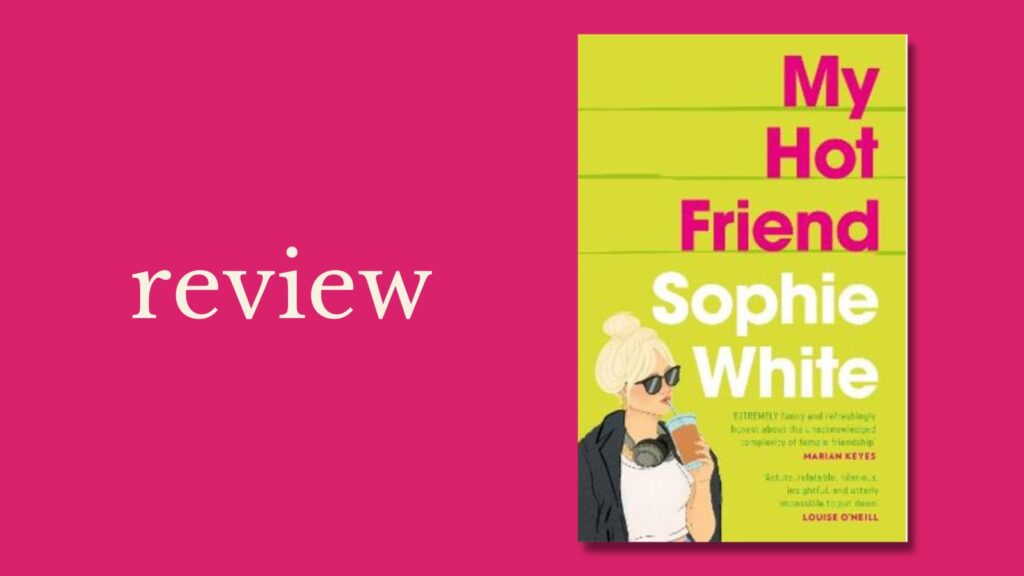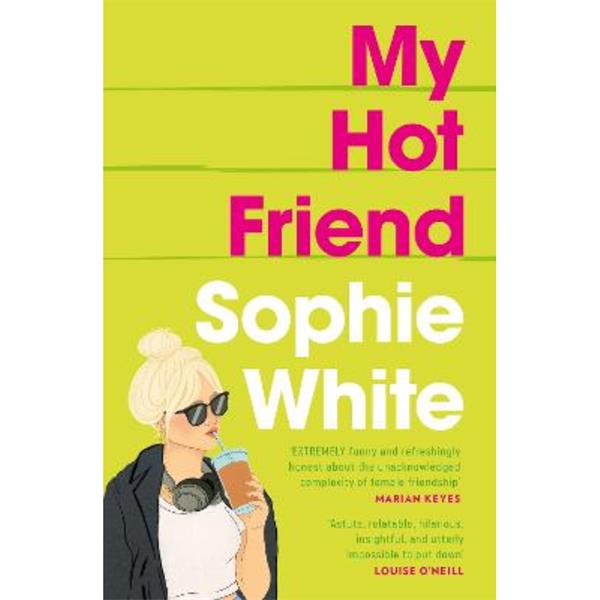
My Hot Friend|Sophie White|Hachette|€16.99
My Hot Friend—mental illness, shame, and loneliness in the new novel by Sophie White
by Laura King
It is a truth universally acknowledged, that a woman in her thirties, left behind by her old group, must be in want of a new friend: at least according to Sophie White’s My Hot Friend, which is about three women navigating friendship and its complexities in the wake of the pandemic and the digital age.
All three of them find themselves out of step with their lifelong friends and their romantic partners: Lexi’s successful podcast is shared with her best friend and boyfriend who don’t have her best interests at heart; Joanne’s friends and partner don’t understand how hard it is being a new mum; and Claire’s friends are icing her out just as her parents’ marriage is imploding.
White’s ability to build and diffuse tension really show her powers as a comedic author, with the weight of her expert handling of darker issues behind her.
I enjoyed how White interrogates the nuances of female friendship, giving it the same focus and attention we would expect her to show towards the romantic partners in the novel, and there is plenty for readers interested in influencer culture to like, but the strongest part of the books are concerned with mental illness, shame and loneliness.
White’s ability to build and diffuse tension really show her powers as a comedic author, with the weight of her expert handling of darker issues behind her.
Unease
White is an incredibly prolific author, journalist and podcast host and her range in media, and even types of books are impressive. Four out of her five novels have been commercial fiction, largely about women’s lives and contemporary culture, whereas her other titles, Corpsing, Where I End and her memoir/cookbook Recipes for a Nervous Breakdown draw on her darker interests.
However, those divisions aren’t quite as black and white as they may seem. You would be forgiven for thinking that this is a light and easy read, judging by the funky cover and tongue-in-cheek title. White’s writing style here is direct and slang-heavy, sometimes overly so, and the novel takes a while to get going.
You would be forgiven for thinking that this is a light and easy read, judging by the funky cover and tongue-in-cheek title.
Yet, as the book goes on she really warms up and the slight uneasiness the reader feels turns to full scale dread for the characters, as White returns to some of her frequent themes: mental illness, body horror, disconnect between internet and reality.
The most striking scenes in My Hot Friend, and where White’s gifts really have a chance to shine, are written about a character undergoing a psychotic episode and the immediate aftermath. White’s description of “the uncanny doll’s house reality”, where people move mechanically, is chilling, and I found I was unable to tear myself away.
She puts the other characters and reader in the affected person’s shoes and asks them to consider what it must be like “to have your mind turn on you like that”. She also, importantly, through the sensible advise of another character, offers a roadmap as to how to support (and more importantly, how not to support) a friend through a mental health breakdown.
Contemporary issues
The novel is also very much of its time, in the same way that Filter This, Unfiltered and The Snag List show contemporary, image and influencer obsessed culture is now, grounded in the current economic climate.
Being a full time “internet celebrity” is positioned as a goal in each of these books, and the novels show how influencers can circumvent traditional means for gaining wealth when they are shut out of those areas – other pathways for success are blocked, so they must find alternatives means.
The housing crisis is very apparent in My Hot Friend; Claire’s parents are stuck in the same house because they can’t afford to separate, which is played for laughs in the book but is a grim reality for many people.
Lexi’s ability to buy a house in Dublin in is only plausible because of a huge deal with a major platform, meaning that she is trapped in a harmful industry until she can gain enough stability to be free from the anxiety of renting. White effectively highlights the precariousness of making a living out of influencer culture—and the other consequences for this type of job on work-life-balance, self-worth and relationships.
Friendships
It is refreshing that the book isn’t particularly concerned with romantic love – though there are some nice moments later in the book with a blossoming romance – but it takes friendships very seriously, and gives them the same weight that commercial fiction and society give romantic relationships.
The beginning of fissures in a strong friendship and working partnership necessitates couples therapy for Lexi and Amanda, and as that breaks down, language of romantic breakup is used.
White raises the question a few times of why we tolerate the same bad behaviour from friends that would raise serious red flags with a romantic partner. Why do we not simply cut out someone exhibiting toxic behaviour, and once there has been a resolution, why do we decide or not decide to give them a second chance as we do with a relationship or marriage?
White raises the question a few times of why we tolerate the same bad behaviour from friends that would raise serious red flags with a romantic partner.
And why do we not allow that these kind of breakups are “painful and complex” too? The power plays and jealousy at work in each of the friendship groups are particularly striking, though at some points feel overdone, and I would have preferred fewer mediations on this to really drive the point home.
To that end, while I really enjoyed Joanne’s character, a no nonsense new mother, I didn’t feel that her point of view chapters were as necessary to move the plot forward. Through those chapters we get astute insights about the conflicts in relationships between new parents, but it slowed down the pace of the book considerably.
In My Hot Friend her humorous appearances through Claire or Lexi’s eyes made her my favourite character, but her point of view chapters felt like a separate, though still enjoyable book about the frustrations of new motherhood.
Different portals
It took me a while to get stuck into My Hot Friend, but once I reached the halfway point I found myself picking it up and stealing a few moments to read another chapter here and there. I always enjoy the ideas in White’s books, but my personal preference is for the writing style she uses in her darker books.
However, I know that a lot of readers will find exactly what they are looking for in this new novel: similar themes to what they’ve enjoyed in her novels in the past, the same immediate, chatty speaking voice they will recognise from White’s podcast, and a book that will hold their interest for close to 500 pages, which is no small achievement.
I really admire White’s ability to write across very different genres, and how she can use the language and structure of those varied genres to speak to what are sometimes quite similar ideas; influencer culture, mental illness, relationships, and the body – and allow us to access her way of seeing the same world through different portals.

Laura King works in publishing in Dublin, and in her spare time reviews books online under the name @lauraeatsbooks.













